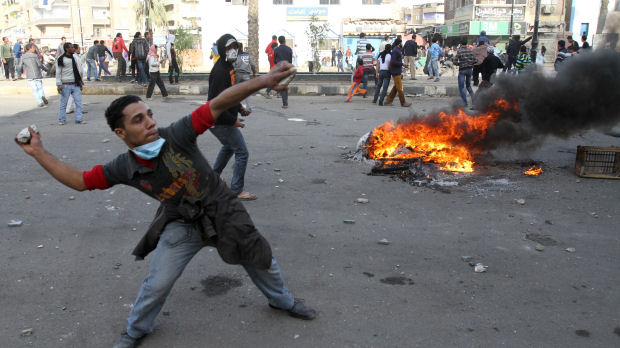Egypt protests spread as ‘huge’ demos planned
As more people take to the streets to protest in Egypt and Nobel Peace Prize winner Mohamed ElBaradei heads back to the country, an activist tells Channel 4 News “huge” demos are planned for Friday.
Police fought protestors in two cities in Eastern Egypt as the unrest continued for the third day.
The demonstrators, who are protesting against the 30-year rule of Egyptian President Hosni Mubarak, could soon have a figurehead in the form of prominent reform campaigner Mohamed ElBaradei, who is flying from Vienna to Egypt to join the protests.
He told reporters that is was time for the President to step aside.
“People in the streets are speaking about the demonstrations – normal, regular people.” Activist Ramy Raoof
“He has served the country for 30 years and it is about time for him to retire,” the former head of the UN Nuclear Agency said.
Friday protests
Mr ElBaradei, who launched a campaign for change in Egypt last year, added: “Tomorrow is going to be, I think, a major demonstration all over Egypt and I will be there with them.”
A blogger and human rights activist told Channel 4 News that he expected and hoped the demonstrations on Friday would be “huge”.
He said: “People in the streets are speaking about the demonstrations – normal, regular people and not only civil society activists. Many, many people have joined the demos in different cities in Egypt.
“People are calling for different things, economic issues, unemployment, against torture and violence, and of course against the current regime and Mubarak.”
The protests have seen police fire rubber bullets and tear gas at protestors throwing rocks and petrol bombs in several cities around Egypt. As well as Cairo, there has been unrest in Suez, where demonstrators set buildings on fire, and Ismailia, where hundreds of demonstrators were met with tear gas.
Witnesses say demonstrators have been dragged away, beaten and shoved into police vans.
An eyewitness in Suez told Channel 4 News: “It is very, very hot. Total chaos and things are out of control. There’s an exchange of gunfire between forces and citizens.”
The situation in Ismailia is understood to be similar.

Unprecedented
The protests are unprecedented during President Mubarak’s rule, and follow similar unrest in fellow north African country, Tunisia, which saw the incumbent President flee.
Thousands of people have also taken to the streets in Yemen, demanding a change of Government. Protestors in all three countries say they are complaining about surging prices, a lack of jobs, and authoritarian rule that has relied on heavy-handed security to keep dissenting voices quiet.
Elections are due in Egypt in September, but the expectation is that the 82-year-old President will either stay in power or pass it to his son Gamal, 47.
Three protestors have been killed in the Egypt unrest, and one policeman. Al-Arabiya television said that 40 protestors had been charged with “trying to overthrow the regime”, and the Interior Ministry said 500 people had been arrested in the country of 80 million people. An independent coalition of lawyers said 1,200 had been detained.
“The millions will decide the future of this nation, not demonstrations even if numbered in the thousands.” Egypt Interior Minister
But the country’s Interior Minister, Habib al-Adli, has dismissed the demonstrations.
“Egypt’s system is not marginal or frail. We are a big state, with an administration with popular support. The millions will decide the future of this nation, not demonstrations even if numbered in the thousands. Our country is not shaken by such actions,” he told Kuwait’s al-Rai newspaper, according to the newspaper’s website.
Egypt’s stock exchange stopped trading on Thursday after it fell for more than six per cent for a second day. The Egyptian pound is at its lowest level in six years against the US dollar.